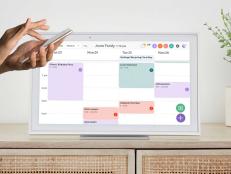How to Create a Family Budget You Can Actually Stick To
Here’s how to set up a realistic budget and get everyone on board


Jamie Grill
Managing your family’s expenses can feel like a daunting task, and if you find yourself quickly closing your banking app just so you don’t have to see how often you swing by Starbucks or the price tag on each of those Amazon deliveries, it’s time to create a budget. According to one survey, more Americans than ever are putting themselves on budget. Up from 70% in previous years, around 80% of Americans say they have put their entire family on a budget.
From managing your household expenses to setting long-term financial goals, here are six realistic ways to create a family budget that works for you.
Choose Your System: It’s important to see where your money is coming from and where it is going, and you’ll need a system to keep track of these numbers. However, you have some flexibility when it comes to which system you are using. While some people are fans of spreadsheets, others find online tools and apps to be the easiest way to manage their budgets. Check out Debt Free Millennials for a quick tutorial on setting up a spreadsheet for your family budget or try out an app like PocketGuard or Mint for easy access to managing and tracking your budget.
Break Out the Bills: This part can be a bit scary -- the numbers. You’ll need everything that shows your income and your expenses. From bank statements, credit card bills, and receipts, you’ll want to be able to see the full picture of what you bring in each month and how much you are spending each month. Gather 60 days' worth of income and spending so you can create a clear picture for your budget. Even if the numbers of what you are spending outweigh what you are bringing in -- remember this is why you are creating the budget.
Call a Family Meeting: As parents, we want to teach our kids the ‘value of a dollar’, and including kids in the budgeting process is a great way to instill money management skills and to help them see that “money doesn’t grow on trees.” It can also be a strong motivator for you to stick to the budget. While all adults need to be on the same page for the budget to work--it helps to have the kids part of the plan too. So if part of your financial goals is to save up for a family vacation, let your kids brainstorm ways to save money, create a family piggy bank that everyone can use to save up for your vacay, and give examples of the types of things the family will cut back on in order to save--less takeout for dinner or having a yard sale to make some extra cash from the unwanted items in your home.
Adjust Your Expenses: Each month you will have fixed expenses- the ones that are the same every month. These are things like your mortgage/rent and car payments. You’ll also have variable expenses and these are the ones that can change monthly like your grocery bills and utilities. You’ll also have the extras like eating out, entertainment, and hobbies. When you are looking to adjust your expenses to pay down debt and to reach your goals -- the extras are where you can begin to cut back. You may even want to explore where else you can save -- call your insurance companies for a better rate or check with your cable provider for any specials they may be running that can lower your monthly costs.
Set Goals: Now that you have a clear picture of what income is coming in and how it is being spent, it’s time to set goals for your budget. If you have goals you are working towards and all of the numbers in front of you, it will be easier to work as a family towards that goal. So if this year you want to focus on paying down debt, adding more to savings, or saving towards a big purchase, you’ll be in a better position with your budget.
Check-in Monthly: Now that you’ve created the budget, you’ll want to check back frequently to update numbers and to make sure you are on track. You don’t need to get bogged down with this process -- but add a monthly budget check-in to your calendar. This will give you a reminder to see if you are spending more than you have allotted for and to adjust the budget if needed. If you find that you have overspent this month, try a weekly or bi-weekly check-in.















